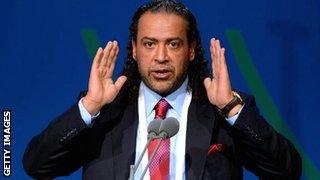New IOC president Thomas Bach wants 'evolution not revolution'
- Published
I'm my own man, says new IOC boss Bach
Thomas Bach has become arguably the most powerful man in world sport after being elected as the International Olympic Committee's new president.
After a long campaign to win the support of his fellow IOC members, the 59-year-old German will certainly have to hit the ground running.
There are less than five months to go until the winter Olympics in Sochi, fears that the 2016 games in Rio could become the target of local protests, and a newly appointed host city -Tokyo - to help prepare for the 2020 Games.
Here he speaks to the BBC's chief sports correspondent Dan Roan about his plans for the job.
On his style as president
Widely respected in IOC circles and with a wealth of experience to draw on as a businessman and lawyer, gold-medal winning fencer Bach was always favourite to succeed Jacques Rogge.
"It is not about being different [from Rogge]," he said of his approach to leadership.
"Every man has his own style so I will follow my own and try to be authentic.
"What the IOC needs is an evolution, adapting to our world which is changing faster than ever.
"But we do not need a revolution because president Rogge has established very strong foundations and has left a great legacy.
"I don't think that it will be easy, because running such an international organisation is a challenge in itself
"But sport is in my heart, the Olympics are in my DNA, so I am really looking forward to rendering a service to sport and trying to give some ideas to its future development."
On gay rights at Sochi 2014
Gay rights campaigners have called for the 2014 Winter Olympics to be moved away from Sochi after a law outlawing the supply of information about homosexuality to under-18s was passed in Russia.
"I think we have to make very clear what the IOC can and can't do," said Bach.
"We have to make it clear that the Olympic Charter has to be fully applied with regard to the Olympic Games and the participants. There we have assurances from the highest authorities in Russia.
"The IOC, on the other hand, is not a supranational parliament or government and our responsibility is respect for the Olympic values in the Olympic Games and its participants and, by respecting the values in the Games, sending a message to society at large.
"It will be up to the IOC to devise a strategy that will deal with the issue in more detail and this we will do in the next couple of weeks or months and then this will be communicated to the National Organising Committees, the athletes and of course to the public."
On Sheikh Ahmad al-Fahad al-Sabah connections

Kuwait's Sheikh Ahmed al-Fahad al-Sabah has been a member of the IOC since 1992
One of Bach's opponents in the presidential election, Switzerland's Denis Oswald, criticised the links between Bach and the influential Sheikh Ahmad al-Fahad al-Sabah. As head of the umbrella group of 205 national Olympic committees, Sheik Ahmed is regarded as a "kingmaker" within the IOC.
"I can start my term with a white sheet of paper because I was the candidate who, when making presentations, told members that I will not promise anything with regard to issues or people," said Bach.
"The only thing I am offering is a dialogue, an intensive dialogue with the members empowering them in the decisions they are making, but no promises."
On the failure of squash and baseball/softball to win a place on the Olympic programme
After assessing the performance of all sports at London 2012, the IOC dropped wrestling from the 2020 Olympic programme, only to then reinstate it ahead of squash and baseball/softball.
"I feel sorry for those sports because you can see how much they did to develop their sport in the past, how much they changed and they gave excellent presentations," said Bach of the beaten bids.
"That is true not only these two sports, but also other sports who made great presentations to the executive board in February or March in St Petersburg.
"We should find a way of how we can stay in touch with these federations and how together we can bring them closer to the Olympic movement."
- Published10 September 2013
- Attribution
- Published10 September 2013
- Published9 September 2013
- Published9 September 2013
- Published8 September 2013
- Attribution
- Published7 August 2013